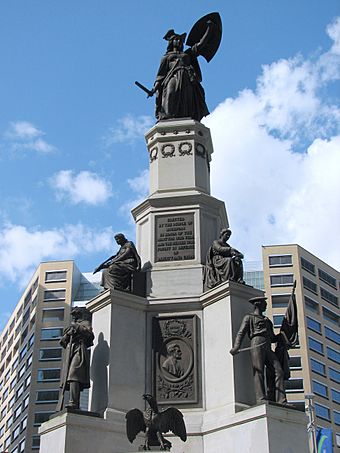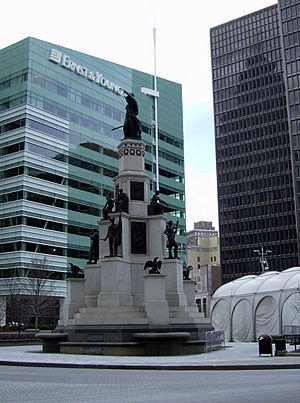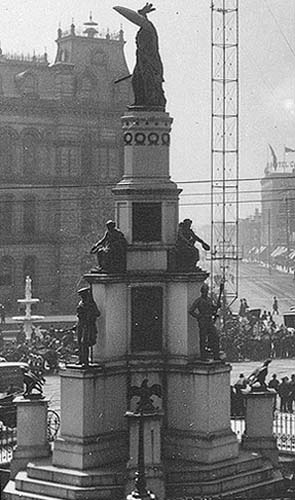Michigan Soldiers' and Sailors' Monument facts for kids
Quick facts for kids |
|
|
Michigan Soldiers' and Sailors' Monument
|
|

Seen in front of Compuware World Headquarters on Campus Martius Park
|
|
| Location | Campus Martius Park Detroit, Michigan |
|---|---|
| Built | 1867 |
| Architect | Randolph Rogers Alexander Chapoton |
| Architectural style | Classical Revival |
| NRHP reference No. | 84001862 |
| Added to NRHP | May 31, 1984 |
The Michigan Soldiers' and Sailors' Monument is a special statue in Downtown Detroit, Michigan. It honors the brave soldiers and sailors from Michigan who fought in the American Civil War. This monument is located in a very important spot called Campus Martius Park. It's where five big streets meet, right in front of the One Campus Martius Building. This monument was added to the National Register of Historic Places in 1984, which means it's a historically important place.
Contents
Building the Monument: A Look at Its History
After the Civil War ended, people wanted to remember the soldiers and sailors who died. In 1865, a group called the Michigan Soldiers' and Sailors' Monument Association was formed. The Governor, Austin Blair, helped start this group. Their goal was to raise money for a monument.
Citizens gave money to help build it. A famous artist named Randolph Rogers was chosen to design the monument. He had already made similar monuments in other states. The monument was finished and shown to the public on April 9, 1872. Important generals like George Armstrong Custer, Philip Sheridan, and Ambrose Burnside were there.
New Life for the Monument: The 2005 Ceremony
In 2005, the monument had a special re-dedication ceremony. This happened after the Campus Martius Park area was rebuilt. A time capsule hidden inside the monument was opened. The list of Michigan soldiers who died in wars was updated. It now included everyone from the Civil War up to April 2005, including those from Iraq and Afghanistan.
Many people took part in the ceremony. There were Civil War re-enactors, who dress up like soldiers from that time. Groups representing Civil War veterans also attended. Members of the Detroit City Council and the Michigan National Guard were there. A men's choir from the Second Baptist Church also performed.
The monument is in the middle of a busy traffic circle. This is where Woodward Avenue, Michigan Avenue, Monroe Street, Fort Street, and Cadillac Square all meet. The area around the monument is open for everyone to visit.
What the Monument Looks Like: Its Design and Figures

The monument was designed by Randolph Rogers. It has several octagon-shaped sections that stack up. At the bottom, there are eagles with their wings spread. They make your eyes look up to the next part.
Figures Representing Military Branches
Above the eagles, there are four male statues. These figures represent different parts of the United States Army and United States Navy. They show the Navy, the Infantry (foot soldiers), the Cavalry (soldiers on horseback), and the Artillery (soldiers who use cannons).
Female Figures and Their Meanings
Above the male statues are four female figures. They stand on pedestals and represent important ideas:
- Victory: Winning a battle or war.
- History: Remembering the past.
- Emancipation: Freedom, especially for enslaved people.
- Union: The United States staying together.
These female statues were added to the monument later, in 1881. Some people believe that the famous African-American abolitionist, Sojourner Truth, inspired the Emancipation statue. However, there isn't much proof for this idea.
Important Leaders and the Top Statue
The monument also has four plaques with carvings called bas-reliefs. These carvings show important Union leaders from the Civil War:
- Abraham Lincoln (the President)
- Ulysses S. Grant (a top general)
- William Tecumseh Sherman (another important general)
- David Farragut (a famous admiral)
At the very top of the monument is a heroic female statue. She is called Michigania or Victory. She holds a sword in her right hand. In her other hand, she raises a shield, ready to protect.
See also
 In Spanish: Monumento a los soldados y marinos de Míchigan para niños
In Spanish: Monumento a los soldados y marinos de Míchigan para niños
 | George Robert Carruthers |
 | Patricia Bath |
 | Jan Ernst Matzeliger |
 | Alexander Miles |


